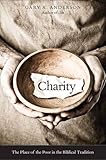In a podcast posted early in May, Stan Guthrie and I talked about some forthcoming books of particular interest. This week I'll highlight two more.
How does a book about the biblical understanding of sin lead to a book about charity? And why is the Catholic doctrine of purgatory central to this study of "the place of the poor in the biblical tradition"?
Several years ago, I had a chance to interview Gary Anderson about his book Sin: A History for Christianity Today magazine. Anderson, a biblical scholar who is currently Hesburgh Professor of Catholic Theology at the University of Notre Dame, emphasized the shift from the Old Testament conception of sin, where—overwhelmingly—sin is metaphorically a weight or a burden, to the New Testament conception, where the metaphor of sin as a debt predominates.
Here is passage from that interview:
One finding that emerged from my work on the book—and it actually came as a considerable surprise—is that once the Second Temple period Jewish writers and Christian writers began to think of sin as a debt, this led immediately to the correlative idea that meritorious actions, virtuous actions, create a credit.
Here the work of George Lakoff and Mark Johnson on the logic of conceptual metaphors is very important. If sin is a debt, that means we owe money. And if virtuous activity is going to be a credit, well, the most obvious way to accumulate credits is by giving away money—hence almsgiving. Within synagogue and church, it's true that one can gather merits by any act of charity. Matthew 25 is a classic instance of that, of clothing the naked, feeding the poor, visiting the sick, and so on. But pride of place in this period is reserved for actually giving away your coins and funding what Jesus calls a treasury in heaven.
Anderson's mention of the "treasury in heaven" reminded me of a passage in his book that had jumped out at me:
One of the most striking passages in your book was when you quoted a poem from Saint Ephrem, the fourth-century Syrian poet and theologian, where he talks about making a loan to God. You pull a phrase from that poem: "The enricher of all borrows from all."
Almsgiving was construed in the divine economy as an act of making a loan to God. It was very early on tied to Proverbs 19:17: "He who is kind to the poor lends to the Lord, and he will reward him for what he has done."
I've been going to church my entire life, and I've never heard a sermon on that passage, which is a very provocative text.
It's incredibly provocative, and in the early church almost every commentator on Matthew 25, that famous text about the Last Judgment, saw it as a fleshing out of the text from Proverbs. By the time we get to Ephrem, we have a very sophisticated theological mind taking this inherited speech about sin as debt and virtue as credit and configuring it in profound ways.
In his new book, Charity: The Place of the Poor in the Biblical Tradition, coming from Yale University Press at the end of August, Anderson builds on these insights to address questions which are always important but which are particularly pressing today. It's a book to read and re-read, to argue with and meditate on.
+ + +
Here are some comments taken from the dust-jacket of a recent novel by Ruth Rendell: "The best mystery writer in the English-speaking world," says Time magazine. If you are inclined to sniff at Time or People (also represented here), there's this from Scott Turow: "Surely one of the greatest novelists presently at work in our language." And this from Patricia Cornwell: "Unequivocally the most brilliant mystery writer of our time. She magnificently triumphs in a style that is uniquely hers and mermerizing." P. D. James (whom I greatly admire) weighs in with praise too, noting Rendell's "remarkable imaginative power to explore and illuminate the dark corners of the human psyche."
And yet, until very recently, I hadn't read Ruth Rendell (who also writes under the name Barbara Vine). I had tried a couple of her books many (many) years ago, not getting very far before coming to the conclusion that she wasn't my cup of tea.
Several weeks ago, I got an e-galley of Rendell's forthcoming novel No Man's Nightingale, due in November from Scribner, the latest installment in her long-running series featuring Inspector Wexford (now retired). I started it, was quickly absorbed in the story (set in motion by the murder of an Anglican priest, a woman), and read straight through. It prompted me to go back to Rendell's first book, From Doon with Death, in which Wexford and his Sussex milieu were introduced. (That novel was published in 1964, when Rendell was in her early thirties.) I've been working my way chronologically through the series since then.
I still can't say I find Rendell congenial, but her work repays attention, book by book and in its sweep over a span of fifty years. If you want to test-drive a novel or two, you have plenty of time between now and November.
John Wilson is the editor of Books & Culture.
Copyright © 2013 Books & Culture. Click for reprint information.











